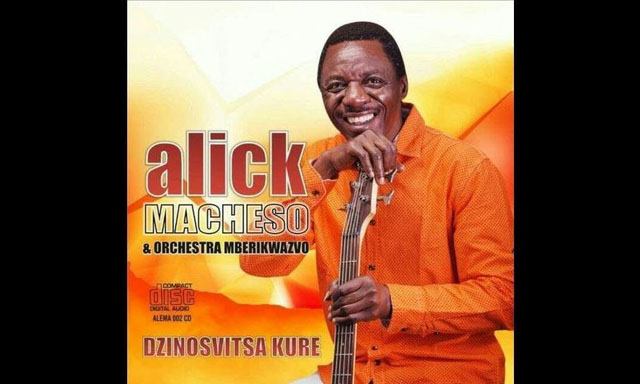
The Sunday Mail

DULL would he be of soul who will not be moved by Alick Macheso’s majesty in ‘Dzinosvitsa Kure’.
Although a corruption of William Wordsworth’s iconic 1802 poem – the above words capture the brilliance of the album – which is a culmination of hard work and unrelenting focus.
It is a product as devastating as the current form of Romelu Lukaku, Cristiano Ronaldo and Luka Modric at the ongoing Soccer World Cup in Russia.
And just as the footballers will confess that it is not their skills alone that have propelled their teams, so says Macheso aka Baba Sharo. In “Dzinosvitsa Kure”, Baba Sharo leads from both the front and the back, he has no monopoly of the bass guitar of which he is arguably the best in the industry.
Also read… http://www.sundaymail.co.zw/average-macheso-got-lucky/
There are pieces on the album such as “Madzitete” and “Vane Zvavanoda” on which he is miles away from the bass guitar, allowing others to showcase what they can do with the instrument.
Also, Macheso resorted to his old way of doing all vocals, in the process getting rid of high intonations that distorted his last offering. After listening to therapeutic melodies on the album, one can forgive all the false starts and conclude that indeed perfection takes time.
The album, which was supposed to be released a year ago has been a slow cook resulting in all the tastes, in the form of bass, rhythm, lead, drums and vocals coming together beautifully. In Macheso’s words “basa rangu kubvonga – vanodya vodya havo, vozodudzira” (my sole duty is to cook and fans determine the quality of the food).
And many might have been impatient for the dish to land on their tables, but the maestro insisted on slow cooking and the entire process of letting all of the ingredients sit together and having flavours mesh over time paid off as the end result has been a balanced tasty meal. “Dzinosvitsa Kure” is that pure bottled water that begins as a cloud, comes down as rain, is filtered by the earth and rocks, collected, and then bottled for enjoyment.
It is a lengthy process, but the end result is worth it. Macheso’s 11th studio album not only proves the king is far from reaching his zenith but that he is a music genius par excellence.
A discerning music ear will be quick to note progression in Macheso’s work in the first two songs on the project.
The album blends the singer’s vintage touch with new sounds that have come to define him of late, making the project refreshing and extraordinary.
Talk of a bird chirrup being mimicked by the lead guitar timbre played by Macheso on “Madzitete”. Exquisite!
Minor glitches in “Dzinosvitsa Kure” have simply been overshadowed by the overall sheer brilliance exuded by the artiste throughout the six-track piece. There are hard-hitting lyrics that are, however, easy to follow.
For instance in the second track “Pfuma Yacho” Macheso sings “Pfuma yacho unoidya nani wapedza vana, mari yacho unoidya nani wapedza dzinza rose, nyangwe mukufara unofara nani wasara wega?”
This danceable track, whose beat like a motor vehicle on a rough terrain cruise intermittently shifts from high to low gears, addresses the dangers of evil rituals like human sacrifices in amassing wealth. Macheso’s composition skills that have made him a household name are also evident in tracks like “Chikuru Kurarama” and “Ndakakutadzirei”.
Fans are left guessing on the intended target of the messages.
Some feel the songs are a dedication to Macheso’s former wife Tafadzwa Mapako. However, a closer analysis can suggest another potential recipient, coming in the form of former manager William Tsandukwa. No need to go into behind the scenes issues on this one. But a simple but sorrowful verse from “Ndakakutadzirei”, says loads.
“. . . ndakakutadzirei iyeni zvaita iwe undidaro nhasi, inga chido ndaiva nacho wani. Akakutadzirei iyeyu chaita umudaro nhasi, takakutadzirei iyesu zvaita utidaro nhasi.”
And it is such ambiguous but poignant messages that have landed the sungura maestro admiration and emphatically won him kingship of the genre. The ultimate temptation for many has been to rate “Dzinosvitsa Kure” against the singer’s previous efforts like “Simbaradzo” and “Zvakanaka Zvakadaro”.
But they should remember that music is dynamic. Indeed a winning formula should never be changed just for the sake of it like Macheso did in his last two productions “Kwatakabva Mitunhu” and Tsoka Dzerwendo” but again the singer should not cocoon himself.
Renowned American rapper Jay-Z continues to explore uncharted waters despite having discovered a style that resulted in his 1998 third studio album “Vol 2-Hard Knock Life” selling over five million copies (his best to date).
Says Macheso: “We have guiding principles though we always try new things.
For instance, there are people that think our songs are too long, however, I cannot bring Zim dancehall, mbanqanga or hip-hop formats into sungura. I’m one of the custodians of the genre and have a duty to make sure it is not corrupted.”
Generally, the six tacks are loaded with a balance of healthy social messages with “Kudzwai” being more of a gospel song that praises the Almighty for his divine mercy and guidance.
“Vane Zvavanoda” encourages people to remain firm on personal life decisions no matter the odds against them while “Madzitete” is a children’s plea for forgiveness from family elders. So far “Dzinosvitsa Kure” has somewhat been endorsed by all-and-sundry across the country’s four corners.
Tracks on the album are receiving favourable airplay.






